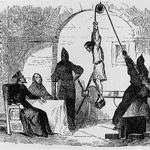(Comitato di Liberazione nazionale Alta Italia) Rather a mouthful both in English and Italian, this was a committee established in January, 1944 in an attempt to coordinate anti-Nazi as well as anti-Italian Fascist partisans. Actually they had already been grouped within purely local Committees of National Liberation, but the CLNAI wanted more: they wished to combat not only the Germans and fascists but also the Allies and the anti-fascist government in Rome.
In December 1944 delegates agreed to the ‘Protocols of Rome’ by which (in return for a healthy subsidy paid by the Allies (!) they promised to surrender power after liberation, presumably to the allied military government. In the last few months of the War in Europe, the CLNAI flourished, much helped by a most unexpected degree of political collaboration between leaders of the principal anti-fascist parties. In fact by April of 1945 the CLNAI controlled northern Italy, with its own administration firmly in place before the arrival of the Allies. Then its members calmly laid down their arms, but had a strong bargaining position used to win greater representation in Rome. The Committee forced the resignation of Bonomi and the appointment of Parri as Prime Minister.
As had happened in France after the Allied victory in Normandy, the population suddenly found collaborators in the home of any enemy they might have, and claimed to have taken part in the Resistance, when, ikn France at least, less than 3% of the French actually took part. Lynching of fellow citizens became a favourite sport in Italy. The CLNAI-dominated government carried out purges against anyone accused of having been pro-fascist during the War, but made the mistake of losing popularity as a result of kangaroo courts and summary punishment. Before long the Parri government got the blame for appalling economic conditions as well as the cruel witch-hunts and fell out of office in December, 1945. The de Gaspero administration replaced it, without noticeable success.










Leave A Comment